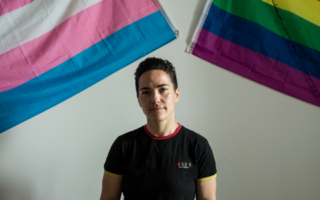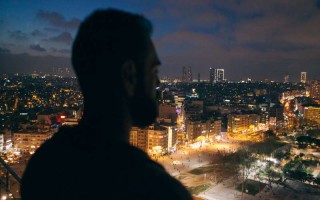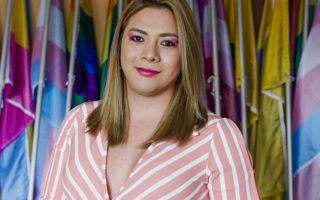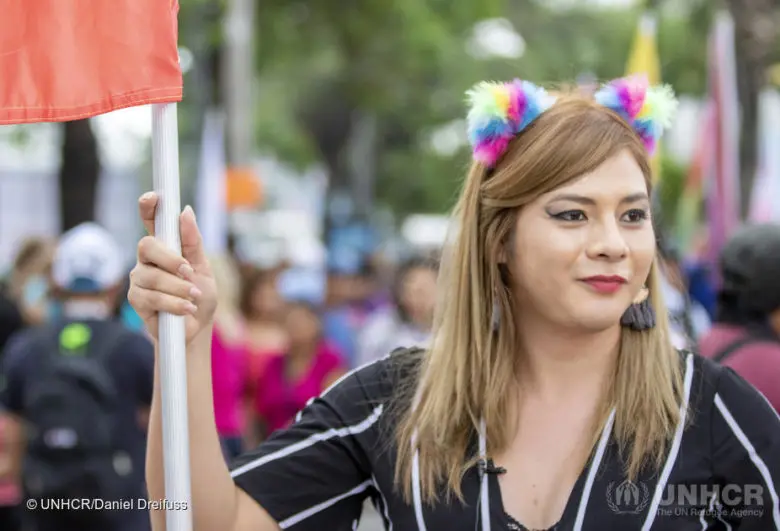
LGBT activist Bianka Rodriguez marches with the rainbow flag at a trans rights parade in San Salvador, El Salvador. Bianka Rodríguez
Celebrating the words and stories of four LGBTIQ+ displaced persons who are empowering the community worldwide.
All around the world, LGBTIQ+ people face violence and persecution on a daily basis. Currently, 70 countries around the world criminalize same-sex relations and, even in countries where homosexuality is not prosecuted, people with diverse genders or sexual identities can face discrimination, isolation and violence from their community and families. Without a safe place to turn, many are forced to flee and become refugees to find protection.
At UNHCR, we believe nobody should be forced to flee their home for loving who they love or being their true selves. In honour of the strength and resilience of the community, we’re amplifying the voices of LGBTIQ+ community members in Canada and beyond.
Danny: Syrian-Canadian author and LGBTIQ+ refugee advocate
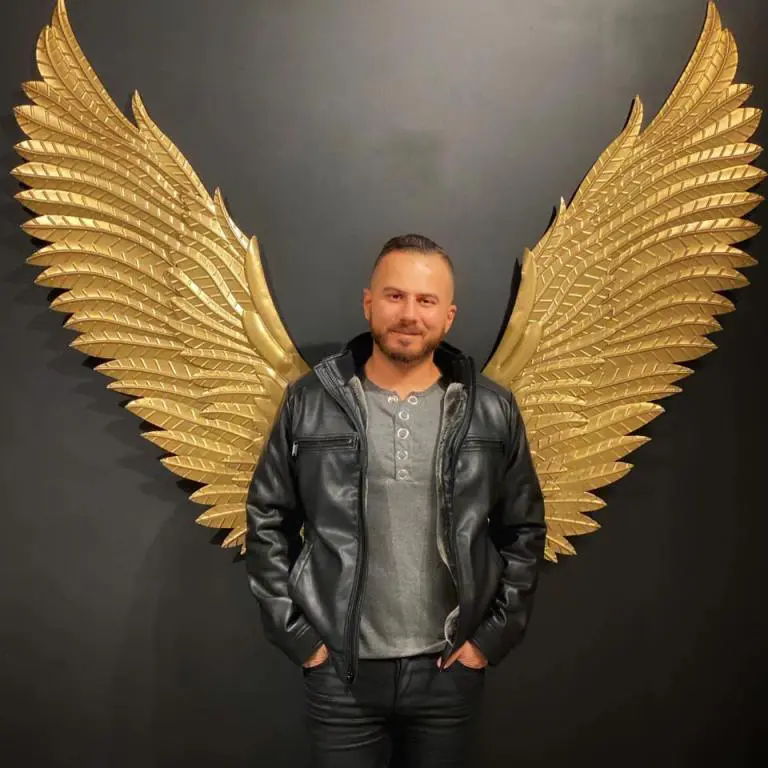
© 2020 Danny Ramadan
Danny Ramadan is a 37-year-old Syrian-Canadian author, public speaker and LGBTIQ+ refugee advocate. He left Syria, his country of birth, in 2012 after spending years there navigating the underground LGBTIQ+ community and advocating for their rights. Danny was among the first Syrian refugees to come to Canada after the crisis started in Syria a decade ago. He became a Canadian citizen in 2019. In our Q&A with Danny, we discuss Pride Month, UNHCR’s work and his advocacy work highlighting LGBTIQ+ issues.
You have raised more than $200,000 for LGBTIQ+-identifying refugees. If you had a message you would like to share specifically for LGBTIQ+ refugees who are beginning to rebuild their lives, what would it be?
Firstly, it took a village for that money to be raised. I just happened to be its mayor. There are so many people, most of whom are refugees themselves, who help me put together the events I do, and raise the money I did.
Secondly, I want LGBTIQ+ refugees to know that I am not some sort of a superhuman with abilities beyond their reach. I totally and completely believe that every single one of them, if offered the opportunities I was offered, could and would take the steps I did. I think you matter, and that you are capable. I think you can do whatever you want to do. I know that the hierarchy of the world around us tells us that refugees are somehow lesser than, but you’re not. You are matured by your experience, hardened by your journey, and capable of things beyond your own imagination.
To you, what is the importance of bringing LGBTIQ+ issues to the forefront of the conversation, especially for vulnerable groups like refugees?
Pride Month is considered a celebration in the Western world. The Great North countries hold much appreciation and celebration during this month to mark the strides we made on this side of the world for our queer rights. However, it is important to remember that Pride started as a protest: this protest brought these rights to us, and our legacy as queer folks should include expanding this protest aspect of pride into issues that are important to us. Issues such as Black Lives Matter, LGBTIQ+ refugee-focused advocacy, and most importantly – an acknowledgement that colonial practices of the past are part of why many countries across the world still practice homophobic and transphobic laws. Pride Month can be a complex set of ideals: a celebration, a protest, an acknowledgment, as well as togetherness in these issues that might affect some of us, but reflect on all of us.
Amy: Gambian LGBTIQ+ refugee and fashion designer
https://twitter.com/Refugees/status/1394286301915099138
“I just watched the sky, closed my eyes, felt the breeze. I just cried and said, ‘God, thank you’”.
Those are the words of 26-year-old Amy, when she first arrived at Schiphol Airport in Amsterdam.
Amy is from Northern Gambia. The community there turned against her after she came out. “There was this time that my dad wanted me to get married. Arranged marriage, because normally that is how my tribe does it. I just said – look, I’m not into it. This is what I am. So, then he told me I didn’t have any option than to leave his house.”
After that, Amy fled the country and travelled to Libya, where she lived with a woman and her baby. She did not know the father was looking for the baby when, one day, the mother and child left.
“After she left with her baby, I was kidnapped. And the people that kidnapped me asked me where she and her baby were. That was where I was tortured. They wanted to kill me. The day they wanted to kill me, I escaped. I went to Tunisia.”
Amy reached the Tunisian border on bare feet where she was granted asylum and eventually resettled to the Netherlands. She’s been in Amsterdam for three months now and feels safe. Amy wants to learn Dutch, start her studies, and share her story with the world through her own clothing line. “I feel great.”
Bianka: The first trans woman to be named a UNHCR High Profile Supporter
Bianka Rodríguez is an LGBTIQ+ activist who was recognized as the Americas regional Nansen winner in 2019 for her leadership in the defense of the rights of LGBTIQ+ people in El Salvador. Now, she’s become the first trans woman to become a High Profile Supporter for UNHCR.
Living in the midst of violence, LGBTIQ+ people in El Salvador are often exposed to unthinkable violence. In 2015, Bianka adopted her true identity as Bianka Gabriela Rodríguez and started volunteering for COMCAVIS TRANS, a local organization. Now, as its Executive Director and President, Bianka has spearheaded the fight for the rights of LGBTIQ+ in El Salvador, including those forced to flee their homes.
“I know what it’s like to face the threat of violence every single day – sometimes from your own family– simply for being who you are or loving who you love. In El Salvador, my country, LGBTIQ+ people are killed, beaten by gangs, sexually abused and persecuted. Trans people face the most danger. In some countries, LGBTIQ+ people are considered criminals. In others, we cannot get a job, go to a doctor or go to school,” Bianka says.
“Many times, our own families have abandoned or abused us. But together we can change things. I am committed to working with LGBTIQ+ people in the Americas (and around the world).”
“Working together, we can build a world in which we are all free to be who we are and love who we love – wherever we are.”
Samra: Pakistani Canadian photographer, writer and activist
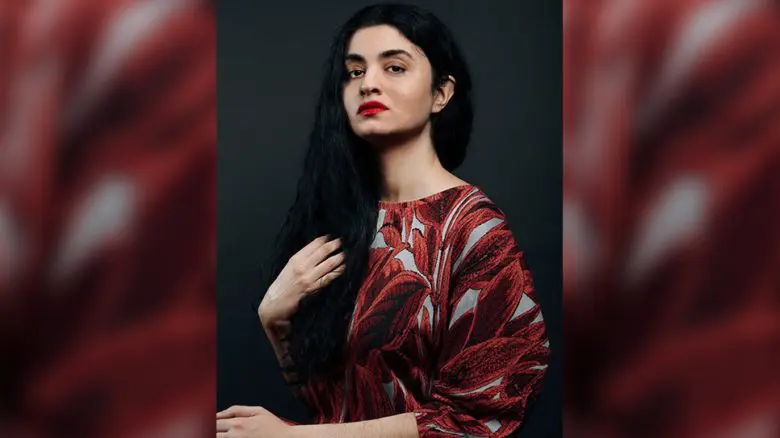
Samra Habib. © Yuula Benivolski
Born in Pakistan, Samra Habib’s family faced regular threats from Islamic extremists, who persecuted Ahmadi Muslims. She was just 10 years old when she and her family were forced to flee their home, resettling in Canada. In our Q&A with Samra, we discuss her acclaimed memoir “We Have Always Been Here” and LGBTIQ+ advocacy.
At the heart of [your] memoir is exploring the intersection of your identity: of being queer, a Muslim, a refugee, a Canadian, and more. “We Have Always Been Here” is your first publication, and it’s a deeply personal book that reflects on this intersection and the obstacles you faced. What was it like having your debut in the literary world be a memoir that deals with so many personal subjects and difficult issues?
It was helpful to write about the impact of all the trauma I had experienced in my life as a result of being a refugee, a person of colour. It helped me see myself for the first time and be kinder to myself.
What is the importance of bringing LGBTIQ+ issues to the forefront of the conversation, especially for doubly vulnerable groups like refugees?
I think it’s important to bring the conversation to the forefront in order to create inclusive spaces and nurture a diverse range of perspectives. I think LGBTQ+ issues need to be universal issues and inform how we talk about inequity and access to opportunities. They need to help inform our lens on equality and creating a sense of belonging.
UNHCR works to support LGBTIQ+ refugees, ensuring that we are both protecting refugees and creating safe spaces for them. As an advocate for queer people, what kind of supports do you think are most important for LGBTIQ+ refugees?
Creating a sense of belonging and creating spaces where they feel validated and seen is pretty important. I think we often view LGBTQ+ refugees as “the other” but we need to create systemic shifts in our immediate surroundings to ensure that we are working alongside them as equity partners to create systemic changes and cultural shifts.
Read our full Q&A with Samra from May 2020.
No one should have to flee for being who they are, or for falling in love. Every LGBTIQ+ person must be able to live peacefully and safely in their own country. Add your name to UNHCR’s pledge and join UNHCR Canada in supporting LGBTIQ+ people who need international protection. Sign the pledge now.



